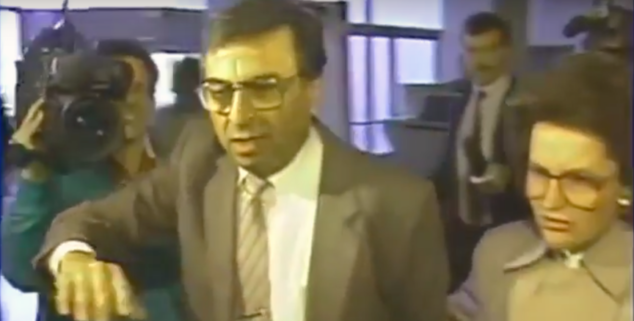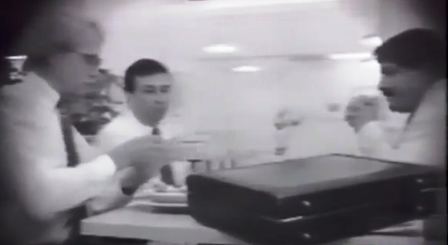News
Where are they now? Joseph Montoya
 Screen capture off Youtube of former state Sen. Joseph Montoya during the aftermath of a federal corruption investigation.(Image source: KCRA, Sacramento)
Screen capture off Youtube of former state Sen. Joseph Montoya during the aftermath of a federal corruption investigation.(Image source: KCRA, Sacramento)In recent legislative history, 2014 was an unusually rough year for the state Senate.
Sen. Rod Wright was on trial for voter fraud and perjury, and Senators Ron Calderon and Leland Yee had been indicted by federal authorities on corruption charges. It was an unusual time and few Capitol staffers had any point of reference to compare it with.
But older Capitol hands did. They recalled that August 1988 night when 30 FBI agents in suits and hats — hats! — swooped into the Capitol with search warrants in a hunt for evidence of political corruption. The raid was the culmination of a federal “sting” operation that came to be known as “Shrimpscam,” a reference to a phony shrimp processing company that played a role in the undercover investigation.
Joseph Montoya was born in 1939 in Rocky Ford, Colorado. He recently recalled that it was during high school, while working as a janitor in 1956, that he heard a speech by Senator John F. Kennedy and knew that he wanted to be a U.S. Senator.
At 29, Montoya, now in California, was elected to the La Puente City Council, serving from 1968 until his election to the Assembly in 1972. He served in the state Assembly until 1978 and in the Senate from 1972 until his resignation in 1990.
Regarding his time in office, Montoya notes that there were several members he served with who were outstanding legislators. These members, were marked by their “honesty, integrity and respect for fellow legislators” and included Assembly Speaker Bob Moretti and Senate Majority Leader George Moscone.
Montoya, a moderate Democrat, was popular with Republicans. In 1986, his final election to the Senate, he was the only Senator of 20 running for reelection that year who ran unopposed. It was during that final term that the FBI began their Shrimpscam investigation, looking into corruption in the California Legislature.
They found Senator Montoya.

Former state Sen. Joseph Montoya, center, shown on a surveillance video with two undercover FBI agents.
In early 1990, Montoya was convicted of seven charges including extortion (five counts), money laundering, and racketeering. The Senate Rules Committee removed Montoya from all of his committees on Feb. 5 and gave him until that Friday to resign or face expulsion. On Feb. 8, Montoya submitted a letter of resignation that read, in part, “I have been requested by the Senate Rules Committee to resign my Senate seat by Friday, February 9, 1990. I am hereby honoring that request.”
By July, Montoya had gone from being the state Senator from District 26 to being Federal Bureau of Prisons inmate 04500-097. He served five years in prison and was released in late 1995.
Meeting him today, Montoya is exactly as he was in the 1980s; loud, humorous and not at all afraid to use coarse words to describe the frustrations of his life. When I met him, the first thing he asked me was whether I was wearing a wire
“Ha-ha, that’s a prison joke,” Montoya said.
Notably, these frustrations include the prosecutor and federal judge from his trial. Montoya doesn’t object to the evidence used in the trial, but he continues to feel that a longtime friendship between the prosecutor and judge hurt his chances at a fair trial.
Montoya also has strong words to describe some of the legislators he served with. Discussing members of his freshman class, he identifies some who were “sneaky” or “tough,” as well as one well-known colleague who he described as a “tattle-tail.”
Not that all of his memories are negative: He described Assemblyman John Thurman of Modesto as “the friendliest farmer I had ever met” and Paul Bannai of Gardena as “a gentle soul who had to be defeated simply because he was a Republican.”
Reflecting on his time in the Legislature, he offered two pieces of advice to new legislators.
Montoya’s first tip is to never forget that every new law has an economic impact on people throughout the state. His second is to be present and focus on the job that he you have now; many legislators want higher office and spend their time focusing on that. Instead, “Do a great job at what you are now doing and that will open up opportunities to move on up.”
Today, Montoya lives in Sacramento’s leafy Curtis Park neighborhood and can frequently be seen driving a car with “S 26 R” retired legislator license plates. He remains proud of his contributions as a legislator, including bills to reform California’s redevelopment laws and create a commission of labor contractors.
Montoya is currently working on an autobiography.
—
Ed’s Note: Alex Vassar, often referred to as the “unofficial historian of the Legislature,” is a state worker and the author of “California Lawmaker.”
Want to see more stories like this? Sign up for The Roundup, the free daily newsletter about California politics from the editors of Capitol Weekly. Stay up to date on the news you need to know.
Sign up below, then look for a confirmation email in your inbox.

Leave a Reply